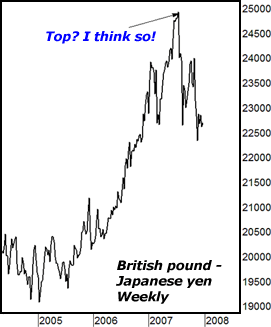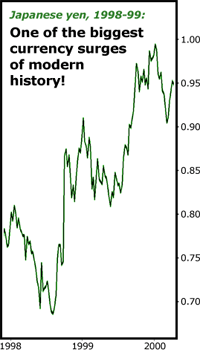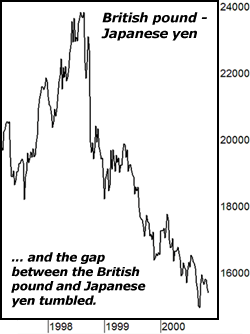British Pound Currency Forecast 2008 - GBP Headed Sharply Lower Against Strong Japanese Yen
Currencies / British Pound Dec 31, 2007 - 01:44 AM GMT Jack Crooks writes: First, and most importantly, I hope you're closing out a happy, healthy and prosperous year. And I wish you the best in everything that 2008 brings.
Jack Crooks writes: First, and most importantly, I hope you're closing out a happy, healthy and prosperous year. And I wish you the best in everything that 2008 brings.
When the markets are as exciting and nerve-racking as they've been this past year, it becomes increasingly difficult for us to look beyond the headlines. But if we are to profit, we must persist.
As has been the case for over 20 years, my job is to help you identify trends, find the resulting opportunities, and execute profitable trades.
So today, I want to share with you one of my most lucrative currency trading ideas for the New Year. But first, let me set the stage by explaining how a perfect storm created this extraordinary opportunity.
A Snapshot Of Risk-Appetite On Wall Street
Equity investors felt good about their portfolios in the first six months of 2007. But that changed when a global credit crunch rocked the risk-taking attitude and shook up equities in the latter half of the year.
The caution flags were finally flying — as they should have been all along! Because after all, the risks were getting harder and harder to ignore:
- Financial firms all over the U.S. and Europe struggling to cope with the credit crunch, taking write-offs in the tens of billions of dollars.
- Subprime mortgage losses and write-downs growing far larger, with cuts and bruises morphing into gaping wounds for major lending institutions.
- Banks precariously close to being unable to expand lending practices — with net losses, ratings downgrades, and dwindling assets all taking their toll on capital.
But even a laundry list of problems couldn't dash all hope; equity investors remained mostly of the bullish persuasion thanks to the Federal Reserve. Looking to placate Wall Street, the Fed lowered the Fed Funds and Discount rates and gave investors a reason to buy stocks.
The "mama-bird-will-save-us" mentality left investors expecting a hand-fed meal of easy profits. But the profits never materialized. In fact, the S&P closed on Friday only about 5% higher than where it opened last January!
Central Bank Bailout Efforts Could Prove To Be Futile!
Subprime mortgage problems on both sides of the Atlantic have morphed into a global credit crisis. Banks have gotten themselves into trouble by investing in what has turned out to be complicated bundles of bad debt.
The whole mess got started when rocket scientists in white lab coats created the most complex investments they could dream up and lumped them into the investment category of debt-backed derivatives.
Turns out, this breed of investments acts a lot differently in the real world than creators expected. And now, banks are stuck with investments they don't understand. They're becoming reluctant to lend money because of the need to stockpile liquidity to offset losses.
There are at least hundreds of billions of dollars of bad debt sitting on the balance sheets of financial institutions everywhere. No matter how much external liquidity is provided by the Fed and others — it's still bad debt.
And even though central banks intend to direct their organized bailout right where the biggest threats exist, their efforts won't be enough to clean up this mess.
That's why I think it'll take a while for banks to get back to doing what banks do best — lending money.
An Interrupted Flow of Money = A Reversion to the Mean
A couple of times throughout the year I made mention of a large imbalance in the foreign exchange market — the widening gap between the British pound and the Japanese yen.
As the pound became increasingly overvalued and the yen increasingly undervalued, it became more and more likely that the gap would soon collapse.
The aforementioned spike in risk-appetite and resulting credit crisis that's agonizing stock markets is just what the doctor ordered for currency traders!
The chart below compares the British pound to the Japanese yen and shows how much the British pound has appreciated against the yen over the past seven years.

The chart also reflects the fact that traders and investors have been shunning low yielding currencies like the yen, in favor of high yield currencies like the pound, for quite some time.
Now, we are all witnessing a dramatic change in investor psyche regarding credit markets. It's a sharp double-edged sword that, if I am right, means the pound has put in a major multi-year top against the Japanese yen .
My conclusion: An excellent trading opportunity lies in selling the pound and buying the yen in 2008!
Here's why ...
As The Bank Of England Loosens Its Reins, The British Pound Will Stumble And Fall
When the British pound pushed above $2, British pound sentiment became overly bullish ... even though the fundamental backdrop in the U.K. was deteriorating!
At that point the market didn't care about fundamentals. Everyone was buying pounds — lots and lots of them. But the credit crisis has now spread beyond U.S. borders, and investors are slowly taking notice.
No one expected the U.S. subprime mortgage fiasco could impact the U.K. economy. We've now found out it could, and it did.
Reluctance among the country's mortgage lenders to lend is taking its toll and U.K. house prices are falling. Credit woes are growing and the Bank of England (BOE) is keeping its eyes peeled for a consumer slowdown that would lead into a broad economic slowdown in 2008.
The (BOE) is already lowering interest rates, and I expect further rate cuts into 2008!
Why? On top of a softening economy, inflation is moderating enough to give the Bank of England some wiggle room. So with inflation only an afterthought, the BOE will turn their attention to the economy and away from interest rates — and ultimately away from the British pound.
Don't Let This Blockbuster Trade Sneak Up On You

In 1998, the yen staged a stunning rally. The trigger was different but the consequence — a sudden credit crunch — was very similar to what you see happening today.
Back then it only took the yen about a month to surge 20% against the dollar. And as you can see in the chart, it didn't stop there.
We're in a strikingly similar position today. There are two reasons why I think the yen can rally at least as much as it did in 1998:
First, the size of the one-way bet against the yen today dwarfs the amount of money that was involved back in 1998!
In 1998, it was estimated there was about $137 billion in Japanese yen carry trade borrowing. Today, that number is estimated at $1 trillion!
Second, the level of investor complacency is still far greater than it was in 1998!
Global financial markets were exceptionally calm for much of 2007. Global growth was strong and investors mostly shrugged off recent concerns.
I doubt that will last in 2008. The yen will appreciate as risk comes to the fore of global financial markets. Risk will shock complacent investors and yen borrowers will be squeezed. As a result, they'll be forced to close out their bets because of the sudden increase in risk.
The unraveling of all these bets against the yen will trigger a massive yen rally — and it will move even further and faster than in 1998.
Be Ready When History Burps Up That Raw-Onion Sandwich
 I recently came across a Julian Barnes quote that I find quite prophetic:
I recently came across a Julian Barnes quote that I find quite prophetic:
"Does history repeat itself, the first time as tragedy, the second time as farce? No, that's too grand, too considered a process. History just burps, and we taste again that raw-onion sandwich it swallowed centuries ago."
Well, history's burping!
In fact, I expect the credit crunch that began this year will be the major catalyst that closes up the British pound — Japanese yen valuation gap ... in the same way the Asian Financial Crisis triggered a huge move in this pair back in 1998 through 2000.
If complacent traders expect a tranquil 2008, I think they will be in for a big surprise. Don't get caught falling asleep in this market!
Enjoy the final days of 2007, and have a safe and happy New Year!
Best wishes,
Jack
This investment news is brought to you by Money and Markets . Money and Markets is a free daily investment newsletter from Martin D. Weiss and Weiss Research analysts offering the latest investing news and financial insights for the stock market, including tips and advice on investing in gold, energy and oil. Dr. Weiss is a leader in the fields of investing, interest rates, financial safety and economic forecasting. To view archives or subscribe, visit http://www.moneyandmarkets.com .
Money and Markets Archive |
© 2005-2022 http://www.MarketOracle.co.uk - The Market Oracle is a FREE Daily Financial Markets Analysis & Forecasting online publication.



